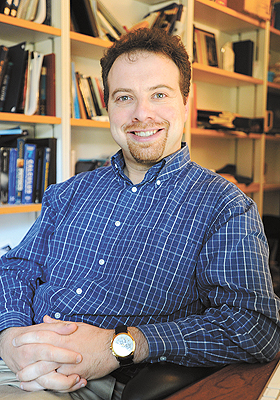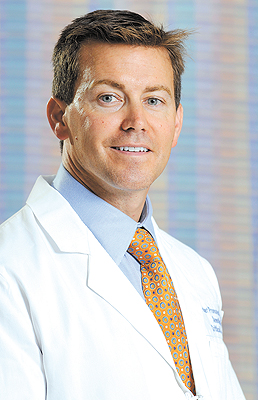Two Professors Receive 'Genius Grants'

Astrophysicist Adam Riess, a
leader in the discovery of the universe's 'dark
energy.'
|
By Lisa De Nike and Gary Stephenson
Homewood and
Johns Hopkins Medicine
Two Johns Hopkins professors — a physician who
champions scientifically rigorous, common-sense
approaches to improving patient safety and an
astrophysicist who was a leader in the discovery of the
universe's "dark energy" — were named last week as
winners of MacArthur Fellowships, the so-called
"genius grants."
The John D. and Catherine T. MacArthur Foundation
announced that it has awarded "no-strings
attached" $500,000 grants to Peter J. Pronovost, professor
of
anesthesiology,
surgery and critical
care medicine in the School of Medicine, and Adam Riess,
professor of physics and
astronomy in the
Zanvyl Krieger School of Arts and Sciences.
Pronovost and Riess, who are among 25 fellows in this
year's MacArthur class, are the eighth
and ninth persons to win MacArthur Fellowships while on the
Johns Hopkins faculty. At least two
other winners have joined Johns Hopkins after receiving
MacArthur awards.
"At Johns Hopkins, the goal of all of the research we
do is to make meaningful and lasting
contributions to humanity," said university President
William R. Brody. "Adam Riess' startling and bold
discovery of the existence of dark energy has transformed
the way we view the universe and has
radically altered cosmology. Peter Pronovost's design of
clinical care practices is saving the lives of
countless patients who might otherwise have been lost to
human error and infection. We thank the
MacArthur Foundation for recognizing these outstanding
individuals and their efforts. We are
fortunate to have them here at Johns Hopkins."
MacArthur Fellowships provide financial support over
five years for the work of individuals
selected for their creativity, originality and potential to
make important future contributions, the
foundation said. A total of 781 MacArthur Fellows have been
named since the program began in 1981.
Winners do not apply for the grants, and may not even be
aware that their names have been suggested
by the foundation's cadre of anonymous nominators.
Riess, 38, was recognized for his leadership in
discovering that dark energy, a mysterious and
still unexplained force, is driving the universe to expand
at an ever-faster rate, overcoming the
effects of gravity. He was first author on a paper
published in 1998 by one of two competing groups
of scientists who made the discovery; his innovative
approach involved comparisons of the "redshift"
of rare Type Ia supernovas spotted at varying distances
from Earth in the farthest reaches of space.
He has shared two of cosmology's most prestigious prizes
— the 2006 Shaw Prize and the Peter Gruber
Foundation's 2007 Cosmology Prize — for this
discovery.
Adam Falk, the James B. Knapp Dean of the Krieger
School, said, "Adam Riess' work has done
nothing less than revolutionize — in ways we would
have thought impossible — our entire understanding of
the past and future of space and time. His discovery of the
acceleration of the expansion of the
universe was one of the great discoveries of the 20th
century, and has completely reoriented not one
but two fields, cosmology and high-energy physics, for the
coming 21st. Adam's scientific vision and
courage are a source of enormous pride for all of us in the
Krieger School of Arts and Sciences," he
said.
Riess graduated in 1992 from the Massachusetts
Institute of Technology and earned his
doctorate in 1996 from Harvard University. He has been on
the Johns Hopkins faculty since 2006 and
is also an astronomer at the Space Telescope Science
Institute, located on the Homewood campus.
From 1996 to 1999, the period during which the dark
energy discovery was made, he was a
Miller Fellow at the University of California, Berkeley.
Since then, Riess has led rigorous efforts to
use the Hubble Space Telescope at STScI to increase the
precision of the dark energy findings, which
are important not only for comprehending the makeup of the
universe but also for understanding its
history and future and in unraveling other important
questions in theoretical physics.
"It is a tremendous honor to be recognized by the
MacArthur Fellowship," Riess said. "I am very
fortunate to work with talented people and with one of the
most advanced scientific tools in the
Hubble Space Telescope."

Physician Peter Pronovost,
champion of patient safety iniatives in hospitals.
|
Pronovost, 43, is an internationally prominent
critical care specialist and patient safety
researcher and advocate who was named one of the world's
"most influential people of 2008" by Time
Magazine for advancing the use of rigorous scientific
research to develop simple tools for greatly
improving patient safety and care. His simple "safety
checklist" has been adopted in Rhode Island,
New Jersey and Michigan, where its routine application
reduced catheter-related bloodstream
infections in patients by up to 66 percent. Pronovost has
written more than 200 articles and chapters
in the fields of patient safety, ICU care, quality health
care, evidence-based medicine and safety
efforts.
"While it's rare for research to impact practice, and
rarer still for it to impact policy, Peter has
a knack for conducting research that does both," said
Edward D. Miller, dean of the School of
Medicine and CEO of Johns Hopkins Medicine. "As medical
director for Johns Hopkins' Center for
Innovation in Quality Patient Care and a member of the
hospital's Patient Safety Committee, he has
been a tireless advocate for the development of innovative,
field-tested and practical patient safety
tools, and [he] is a frequent speaker to hospital staff,
health care administrators, policy-makers and
patient safety groups."
Pronovost also serves as a faculty member in Health
Policy and Management at the university's
Bloomberg School of Public Health, where he established a
World Health Organization-sponsored
master's degree program that focuses on improving clinical
performance and patient safety.
Pronovost came to Johns Hopkins after graduating from
Fairfield University in 1987, earning a
medical degree in 1991 from the School of Medicine and a
doctorate in 1999 from the Bloomberg
School of Public Health. He is director of the Johns
Hopkins-affiliated Quality and Safety Research
Group.
"I was stunned when I learned I have been given this
great honor," Pronovost said. "I knew of
the MacArthur as the 'genius' award and did not think I fit
that description. We try to prevent
needless deaths, suffering and costs of health care by
bringing science to the delivery of care. By
necessity, the science has to be made practical and easy to
implement. Indeed, it only works if we find
the right balance between being scientifically sound and
simple and then applying these principles to
real-world problems. While we are certainly grateful to the
MacArthur Foundation for this wonderful
honor, our true reward is saving lives and reducing
harm."
This is the second time that two Johns Hopkins faculty
members have won MacArthur grants in
a single year and the third time that Johns Hopkins
professors have been honored in consecutive
years. Professors Kay Redfield Jamison and Geraldine
Seydoux, both of the School of Medicine, were
named MacArthur Fellows in 2001. The most recent previous
winner was Lisa Cooper, a professor of
medicine with joint appointments in Nursing and Public
Health, in 2007.
Also named MacArthur fellows while on the Johns
Hopkins faculty were Fouad Ajami, professor
of Middle Eastern studies at SAIS, 1982; Philip Curtin,
professor of history, Krieger School, 1983;
Horace Freeland Judson, professor in the Writing Seminars,
Krieger School, 1983; and Alan Walker,
professor of cell biology and anatomy, School of Medicine,
1988.

Alumna Adichie Also Receives 'Genius
Grant'
Acclaimed novelist Chimamanda Adichie, who in 2004
earned a master's degree from the
Writing Seminars in the Zanvyl Krieger School of Arts
and Sciences, is one of the 25 scholars,
scientists and artists who this year received a prestigious
MacArthur Fellowship.
Inspired by events in her native Nigeria, Adichie's
writing explores the intersection of the
personal and the public by placing the intimate details of
the lives of her characters within the larger
social and political forces in contemporary Nigeria.
Living between the United States and Nigeria for the
past decade, Adichie, 31, is widely
appreciated for her stark yet balanced depiction of events
in the post-colonial era. Her debut novel,
Purple Hibiscus (2003), won the Commonwealth
Writers' Prize and the Hurston/Wright Legacy Award.
Her most recent book is Half of a Yellow Sun
(2006), a novel that depicts the horror and destruction
of the civil war following the establishment of the
Republic of Biafra. Her short stories have appeared
in such publications as The New Yorker, Granta and
The Virginia Quarterly Review.
"Amid a number of very talented young writers,
Chimamanda was remarkable for both the
richness of her material and the maturity of her style,"
said Alice McDermott, the Richard A.
Macksey Professor for Distinguished Teaching in the
Humanities. "In
our workshop, she immediately
distinguished herself as a natural storyteller, with a fine
sense of scene and character, and an instinct
for finding the human element in the complex political and
cultural history of her country.
"Chimamanda was also remarkable," she continued, "in
that she already had a publisher for her
first novel when she came to Hopkins — inspiration
for all the young and as-yet-unpublished writers in
our class."
In addition to her degree from Johns Hopkins, Adichie
received a bachelor's degree in 2001
from Eastern Connecticut State University and a master's
degree in 2008 from Yale University.
She is one of 11 Johns Hopkins alumni who have been
awarded MacArthur Fellowships since the
program began in 1981.
— Amy Lunday
 GO TO SEPTEMBER 29,
2008
TABLE OF CONTENTS.
GO TO SEPTEMBER 29,
2008
TABLE OF CONTENTS.
 GO TO THE GAZETTE
FRONT PAGE.
GO TO THE GAZETTE
FRONT PAGE.
|